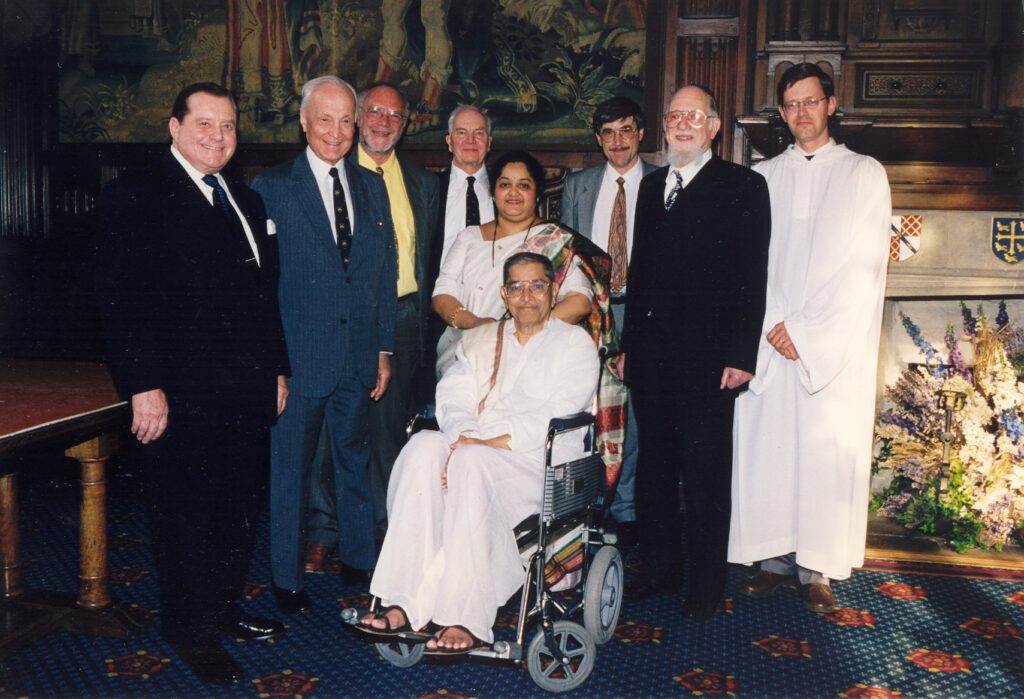Celebrating 1997 Templeton Prize Laureate Pandurang Shastri Athavale
By Samantha Cocove
In 1973, the first Templeton Prize was given to Mother Teresa. In 2023, we celebrate the 50th anniversary of this award. Over the next 52 weeks, we will highlight each of our laureates and reflect on their impact on the world. From humanitarians and saints to philosophers, theoretical physicists, and one king, the Templeton Prize has honored extraordinary people. Together, they have pushed the boundaries of our understanding of the deepest questions of the universe and humankind’s place and purpose within it, making this (we humbly think) the world’s most interesting prize.
Pandurang Shastri Athavale, a renowned Indian philosopher, social reformer, and spiritual leader, led a remarkable life dedicated to promoting moral and spiritual values. Born on October 19, 1920 in Maharashtra, India, Athavale’s profound contributions to society and his relentless pursuit of spiritual enlightenment led him and his co-workers to develop the Hindu practice of swadhyaya, a form of self-study that inspires each individual to recognize an inner God, cultivate an increased self-respect, and abandon immoral behavior.
Athavale’s journey began with his quest for knowledge and truth. With the guidance of his father at the young age of 12, he immersed himself in the study of ancient Indian scriptures and philosophy, delving deep into the wisdom of the Vedas, Upanishads, and Bhagavad Gita. These spiritual foundations would shape his life’s work and guide his vision of a more harmonious and compassionate society.
One of Athavale’s central teachings was the concept of “universal spirituality.” He believed that spirituality should transcend religious boundaries, emphasizing the unity of all faiths and fostering a sense of interconnectedness among individuals. Athavale advocated for the idea that spirituality should not be confined to personal salvation, but should manifest through selfless service to humanity.
In pursuit of his vision, Athavale founded the Swadhyaya Parivar (Family of Self-Study) movement. This transformative initiative encouraged individuals to engage in self-study, reflection, and spiritual contemplation. Through self-awareness and inner growth, Athavale sought to empower individuals to lead meaningful lives driven by moral values and a deep sense of social responsibility.
Athavale’s teachings resonated deeply with people from all walks of life. His emphasis on moral values and social reform inspired individuals to take action and make a positive impact in their communities. He actively worked towards uplifting marginalized sections of society, addressing issues such as poverty, illiteracy, and social disparities. Beyond his contributions to social reform, Athavale was also a beacon of spiritual wisdom. His teachings emphasized the cultivation of virtues such as humility, compassion, and love.
In 1997, Athavale was awarded the Templeton Prize in recognition of developing the swadhyaya practice and its impact on countless individuals on their personal journeys towards inner transformation and self-discovery.

HRH Prince Philip, Duke of Edinburgh, presented Athavale with the Templeton Prize at a ceremony in 1997 at Westminster Abbey. Other esteemed guests included Canon Colin Semper, Templeton family members, and several previous Templeton Prize Laureates: Thomas Torrance (1978), Lord Jakobovits (1991), Paul Davies (1995), and William Bright (1996).
Religion was the first and the foremost institution that gave intellectual introduction of God and revealed the relationship of self with Him and enabled man to explore the meaning of life.
Pandurang Shastri Athavale
Every religious tradition, including Buddhist, Christian, Hindu, Jew, Moslem and others, has yet to see the fulfilling of God’s purpose for us. That future lies before each one of us.
Dr. John M. Templeton, Jr.
Still Curious?
Learn more about 1997 Templeton Prize laureate Pandurang Shastri Athavale.